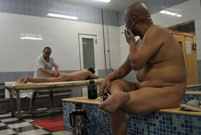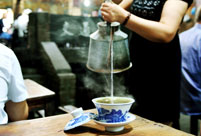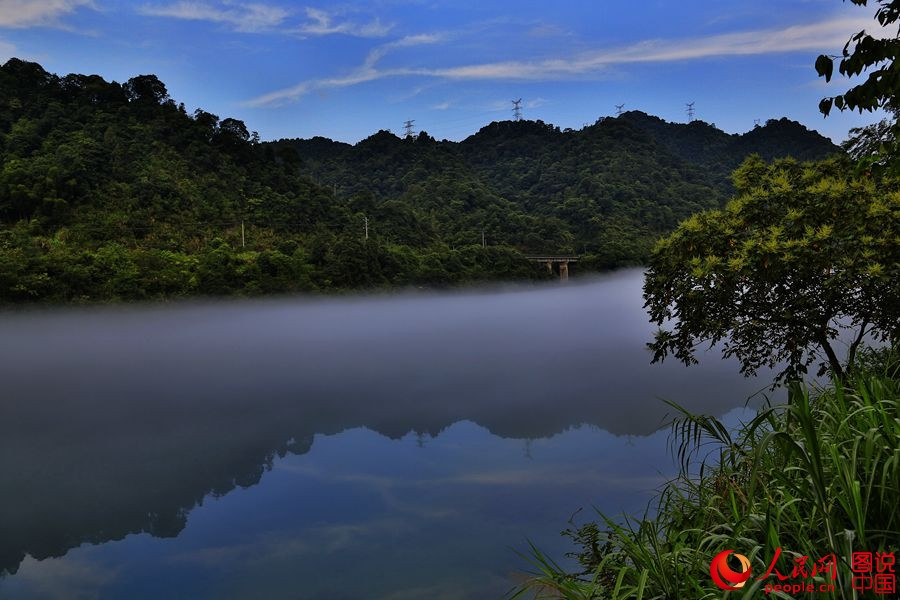 Breathtaking scenery in Redstone Park in SW China
Breathtaking scenery in Redstone Park in SW China
 Vintage cars show kicks off in London
Vintage cars show kicks off in London
 Gorgeous scenery in NE China
Gorgeous scenery in NE China
 Picturesque Barkol grassland in Xinjiang
Picturesque Barkol grassland in Xinjiang
 Small Wild Goose Pagoda - A World Cultural Heritage Site along the Silk Road
Small Wild Goose Pagoda - A World Cultural Heritage Site along the Silk Road
 Maritime Silk Road Luxuries of the Han Dynasty
Maritime Silk Road Luxuries of the Han Dynasty
 Ciao! Chinese beauties!
Ciao! Chinese beauties!
 An eye feast: BFA freshmen registration
An eye feast: BFA freshmen registration
 Top 10 most lavish weddings
Top 10 most lavish weddings
 Most amazing chi-pao beauties
Most amazing chi-pao beauties
INCHEON, South Korea, Sept. 27 -- China has bagged the greatest number of gold medals, 22 out of 38, in the Asian Games swimming competitions which wrapped up on Friday night. However, Japan has got more "heavier" gold medals with world-class results.
China's dominance in Asian swimming pools has been consolidated at the Asian Games, as China took 22 golds, 11 silvers and 12 bronzes. Japan followed with 12 golds, 20 silvers and 13 bronzes, while host South Korea led by Park Tae-hwan got 2 silvers and six bronzes.
Kazakhstan, Singapore, Hong Kong of China, Vietnam and India have managed to take a position on the medal tally.
Kazakhstan had three golds and two silvers. Singapore got one gold, two silvers and two bronzes. The rest medals were shared by Hong Kong of China with three bronze, Vietnam with two bronzes, and India with one bronze.
Sun Yang of China demonstrated his power in middle and long distance freestyle events. Losing by surprise in 200m to Japanese all-round star Kosuke Hagino, Sun left no chance for other competitors including Hagino and Park of South Korea, in the following 400m and 1,500m events. He also helped the Chinese team to stage a victory in 4x100m freestyle relay.
Apart from the medals, the Chinese team reaped new stars at the Asiad. Ning Zetao has been crowned as Asian King of Sprinters with a new Asian record of 47.70 seconds in 100m freestyle event. The result ranks No.3 in this year's FINA world ranking. His 100m results in the two relay events, 4x100m freestyle and 4x100m medley relay, were even faster, although results in relays would not be recognized as effective.
Former head coach of Chinese swimming team Chen Yunpeng told Xinhua that he has pinned hope on Ning to make breakthrough for Chinese male swimmers in sprinter events at world stage.
Before him, Jiang Chengji had the best performance among all male sprinters to rank fourth in 50m freestyle and 100m butterfly at Atlanta Olympic Games in 1996.
Backstroker Xu Jiayu and 15-year-old Li Zhuhao, specialized in butterfly, are another two young stars in the men's team. Though Xu was beaten in both 100m and 200m backstroke by Japanese veteran Ryosuke Irie, his personal best in 100m of 52.34 seconds could reach world's best result this year.
Li, not yet ready to take golds in individual events, played a key role in relay events, especially the 4x100m medley relay on Friday.
China is well ahead of other Asian teams in women's events. Olympic champion Ye Shiwen, Jiao Liuyang and Liu Zige all showed up in Incheon, securing the golds in their specialized events.
Ye took two golds in 200m and 400m individual relay and helped the Chinese team to take gold in 4x100m freestyle relay.
Jiao and Liu served as the double insurance for China in butterfly events. Jiao bagged 200m butterfly at these Asian Games.
Meanwhile, 16-year-old Chen Xinyi has become the brightest star among Chinese women swimmers, taking golds in short distance butterfly events of 50m and 100m.
After the success in Pan Pacific Swimming Championship last month, Japan might not be as outstanding in gold rush as people had expected at the Asian Games. However, the world's top ranking results in six events are what they can brag.
Hagino, with four golds, one silver and two bronze at hand, achieved the world's best results in 200m and 400m individual medleys with one minute 55.34 seconds and four minutes 07.75 seconds.
Daiya Seto's result of one minute 54.08 seconds in 200m butterfly, Ryosuke Irie's result of 52.34 seconds in 100m backstroke and one minute 53.26 seconds, and Junya Koga's result of 24.28 seconds in 50m backstroke also reached the best results in FINA world ranking.
Sun Yang commented that despite more gold medals, China is still lagging behind of Japan in overall strength especially in men's events.
"We only managed to overwhelm them in freestyle events. Actually the Japanese are very good in butterfly, backstroke, breaststroke and even medley events," Sun said at the press conference on Friday, "I think the Japanese have a lot for us to learn."
Fresh air comes from Kazakhstan and Singapore.
Kazakhstan bagged three golds, all coming from 19-year-old Dimitriy Balandin, who swept golds in men's 50m, 100m and 200m breaststrokes, crowning himself the new King of Breaststroke in Asia.
Joseph Isaac Schooling of Singapore took gold by surprise in men's 100 butterfly, the country's first gold in men's swimming events since 1982. A University of Texas freshman, Schooling will be having his training in the U.S. His result of 51.76 seconds will make way to the world's top eight this year.
Park Tae-hwan of South Korea upset the home crowd by taking only one silver and five bronzes. However, he had swam as fast as Sun Yang in 400m freestyle at the Pan Pacific Swimming Championship last month. A tight schedule and multiple entries at these Games might have cost him a well-deserved gold.
While the Asian Games have ended for the swimmers, China, Japan and South Korea have all set their vision on the World Championship next year and the Olympics in Rio in 2016.
 Female bus driver drives Land Rover for commuting
Female bus driver drives Land Rover for commuting Top 3 iOS 8 features Chinese love most
Top 3 iOS 8 features Chinese love most Century-old public bath closes door in Beijing
Century-old public bath closes door in Beijing Teahouses in Chongqing: Worship to the leisure lifestyle
Teahouses in Chongqing: Worship to the leisure lifestyle Leading director Wang Quan'an detained for 'buying sex'
Leading director Wang Quan'an detained for 'buying sex' Heaven on earth: Dongjiang Lake in Hunan
Heaven on earth: Dongjiang Lake in Hunan Mixed reaction to smartphone sidewalk
Mixed reaction to smartphone sidewalk Amazing aerial photos of China's Xisha Islands
Amazing aerial photos of China's Xisha Islands Top 10 world's highest-paid models 2014
Top 10 world's highest-paid models 2014 Lingerie show at 2014 Miss China
Lingerie show at 2014 Miss China Songstress Li Xianglan dies at 94
Songstress Li Xianglan dies at 94 Police recruiting posters
Police recruiting posters Anshun Daxi- Living fossil of Chinese drama
Anshun Daxi- Living fossil of Chinese drama Urban farmers in China
Urban farmers in China 'Firepower-2014 Weibei'military exercise
'Firepower-2014 Weibei'military exerciseDay|Week|Month